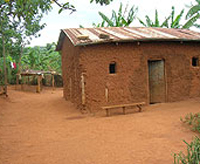
Feature Story
UNICEF: Communities provide a bigger ‘family’ for orphaned children in Rwanda
09 March 2009
09 March 2009 09 March 2009This story was first published on UNICEF.org

Clementine, 18, and her sister, both HIV-tested and safe in eastern Rwanda.
Credit: UNICEF/2009/Frejd
Bamporeze is a non-governmental organization that started a community-based protection programme for children orphaned by AIDS in Rwanda soon after the genocide in 1995. Around 150,000 people live with HIV in Rwanda; 19,000 of them are children.
Clementine, 18, lives in eastern Rwanda and has been deeply affected by the AIDS epidemic.
“My parents died from an AIDS-related illness a few years ago,” she said, “but no one told us what they had or that we, too, should be tested.”
"My parents died from an AIDS-related illness a few years ago, but no one told us what they had or that we, too, should be tested."
Clementine, 18, lives in eastern Rwanda and has been deeply affected by the AIDS epidemic.
Clementine and her siblings were tested and now have a larger group they can rely on – an extended ‘family’ consisting of members of the community, mobilised by Bamporeze, who found out about Clementine and her siblings after their parents died.
Community support for orphans
While working with orphans, Bamporeze realised that foster families were not sustainable for all the orphans.
“There were just too many orphans,” said Bamporeze founder and coordinator Jeanne D’Arc Muhongayire. “So we decided to see how we could work with the whole community to try to rebuild children’s lives to create a feeling of a common responsibility for orphans.”
To create this larger family, Bamporeze, with support from UNICEF, helped orphaned children continue their education, learn skills and access information on reproductive health and life skills. Children in Clementine’s area also started their own agricultural cooperative to earn income to buy books, medicines and clothes. Bamporeze helped them find mentors who could be like parents to them.
A mentor to serve as parent

Clementine’s home in Rwanda; both of her parents died of AIDS-related illnesses several years ago.
Credit: UNICEF/2009/Frejd
“When Clementine and her siblings lost their parents, they were initially isolated from the other families,” said Patrick, who works with Bamporeze. “This happens to other children as well, and as their homes are spread out, it is hard to reach all of them to tell them that they are not alone.
“In fact,” Patrick continued, “I spend a lot of my time walking from one children’s household to another to ensure that all are registered with us and have access to the services. I then selected a mentor from the village – a person they trust and think can give them the support they need.”
“Our mentor comes to visit us every day,” said Clementine. “I talk to her about anything and she has introduced me to other children like us. It is good to know that we are not alone.”
Government bears responsibility
Bamporeze’s community-based programme for orphans has succeeded in registering every orphaned child with local authorities.
“This means that local government now also knows about these children and bears responsibility for their well-being,” said the Head of UNICEF Rwanda’s HIV and AIDS Section, Bernardine Mukakizima.
“Bamporeze has helped initiate a programme that serves as an example to other communities in this country,” she added. “We don’t have to wait for foster families or adoptions or even rely on them, if a community is mobilised and feels a sense of ownership for ‘its’ children, then orphaned children around this country will know that they are not alone.”
UNICEF: Communities provide a bigger ‘family’ for orphaned children in Rwanda
Cosponsors:
Feature stories:
Home Truths: Facing the facts on children, AIDS, and poverty (19 February 2009)
Revival of old traditions brings hope to orphans in Swaziland (30 August 2006)



